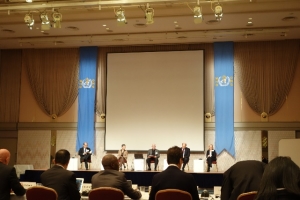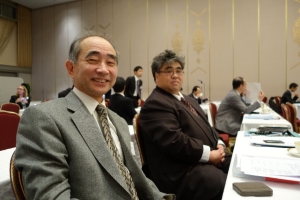Report of WHO Kobe Center Consultation 2015

Date: 14 December 2015
Organizer:WHO Centre for Health Development
(WHO Kobe Centre), in collaboration with
Japan Ministry of Health, Labour and
Welfare (HHLW)
Venue:Kobe Portopia Hotel, Kobe, Japan
Theme:Research for Policy Innovations for UHC
and Ageing Populations: Transforming
Health Systems to Meet the Holistic Needs
of Older Persons
Participants from Gunma University WHO Collaborating Centre
Dr. Hideomi Watanabe, Professor
Dr. Hiromitsu Shinozaki, Professor
Dr. Hiroki Matsui, Assistant Professor
Summary in brief
Much of the increase in the world’s aging population will occur in low and middle income countries, and for many countries. Universal health coverage (UHC) provides an excellent opportunity to develop health and social delivery systems to support older persons. Capitalizing on the many lessons from Japan, the global WHO Kobe Centre’s new ten year research strategy on UHC and innovation for ageing populations is documenting social, system and technological innovations that are fit for purpose and respond to the needs of older persons and to design coordinated and integrated health and social care systems. This meeting explored the nature and role of policy innovations to transform health systems in the context of UHC to support older populations. It preceded an International Conference on Universal Health Coverage in the New Development Era: Toward Building Resilient and Sustainable Health Systems that took place in Tokyo on 16 December. Presentations and discussions were active and highly suggestive for participants from academia as well.
The Center’s comment
Prof. Watanabe commented that “To avoid silo approach, a systematic approach to let the multi-sector players know the importance of collaboration. This approach is not necessary for the players who have a mindset that understands the importance and the skills. But it essentially required for the players who do not understand the importance. So Just to say and advocate that the collaboration is importance is insufficient and sometimes do not work effectively. I think systematic educational approach is required. Actually the educational approach may provide advantage and disadvantage as results. Then “may” is not good. We have to know the concrete effect of the education. In terms of education for training field, monitoring and evaluation of educational initiatives are sometimes neglected, but should be very important. The importance of this educational approach and the research on the effect is not restricted to silo approach, but is to other HRH issues in terms of quality, equity, sufficiency, accountability and resilience of UHC as well“.

Dr. Hiroki Matsui
Center for Research and Training on Interprofessional Education
24 December, 2015









